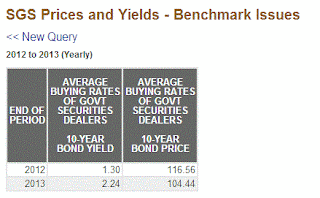Tatas are going to start an airline business in India in collaboration with Singapore Airlines. An extract from Singapore Airlines 2012 annual report is noted below:
S$13 b of equity capital has been supplied by the shareholders and S$1 b by the lenders. While we can accept that lenders will be able to get their required rate of return, it is not the case for the shareholders of the company. Both return on capital and return on equity have been very poor.
Just look at the volatility in the operating income and net income in the past years:
How would you feel if you were a shareholder in this firm? There is no stability in the rate of earnings, requires a lot of capital, and is subject to severe competition and adverse market conditions.
The only good news is that debt is not high, and whatever it is, carries a low cost.
Now, back to the Tatas; they have a long history regarding aviation is fine. But the economics of this business so bad that I wonder why investors would want to venture into this high-entry-barrier business. I say high-entry-barrier because, it has absolutely no competitive advantage, is submissive to the prevailing market conditions, generates very low return on capital, has no pricing power, and is capable of burning cash.
Aren't these high-entry-barriers for sensible investors to supply capital?
Singapore Airlines shareholders had a choice of investing S$13 b (book value of equity) or S$12 b (its current market value) at a risk-free rate, and yet, would have earned similar returns compared to its 2012 earnings.
If they had additional S$13 b would they invest in Singapore Airlines stock now and ask for 3% returns? Probably not. They would ask for more; but how much more? Well, that's left to them.
Temasek Holdings (Pte) Ltd, the largest shareholder (55.86%) in Singapore Airlines, reports that its long-term returns to its shareholders is 16% p.a. Well, if that is the case, their investment in Singapore Airlines has not been that good.
If you were a shareholder of Singapore Airlines, how much would you ask?
Temasek Holdings (Pte) Ltd, the largest shareholder (55.86%) in Singapore Airlines, reports that its long-term returns to its shareholders is 16% p.a. Well, if that is the case, their investment in Singapore Airlines has not been that good.
If you were a shareholder of Singapore Airlines, how much would you ask?
And how much the Tatas would ask when they start Tata SIA Airlines, that is, if they want to earn a fair rate of return? If the intention is to start the airline to fill that unfulfilled ambition, I have no questions, but wish them luck.




No comments:
Post a Comment